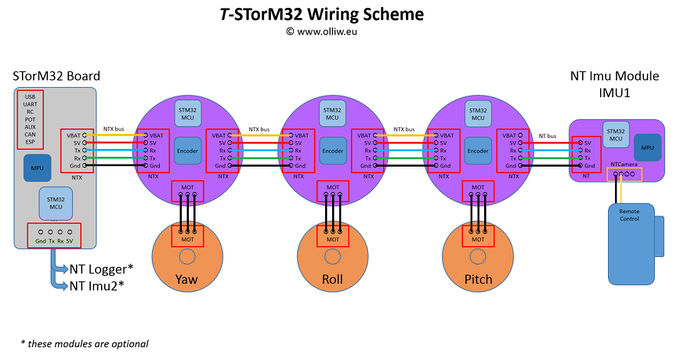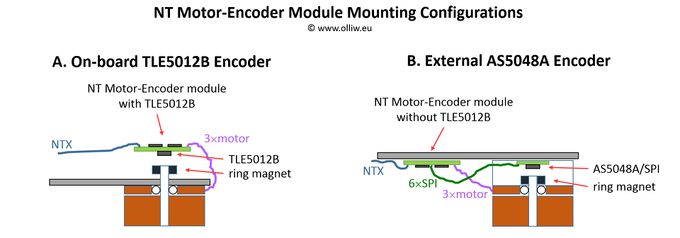What is T-STorM32 about?: Difference between revisions
| (18 intermediate revisions by the same user not shown) | |||
| Line 1: | Line 1: | ||
T-STorM32 is the encoder version of the STorM32 gimbal controller. | T-STorM32 is the encoder version of the STorM32 gimbal controller (T stands for Thunder, so Thunder-STorM32). | ||
=== Concept === | === Concept === | ||
The T-STorM32's encoder support builds on the [[What_is_STorM32_NT_about%3F|NT concept]], and especially on the possibility of connecting specialized motor modules to the NT bus. T-STorM32 achieves its goals by using motor modules which also include | The T-STorM32's encoder support builds on the [[What_is_STorM32_NT_about%3F|NT concept]], and especially on the possibility of connecting specialized motor modules to the NT bus. T-STorM32 achieves its goals by using motor modules which also include or handle the encoders. These modules could thus be called NT Motor-Encoder modules. | ||
The T-STorM32's concept consists of a main STorM32 controller board and three NT Motor-Encoder modules, one for each axis. | The T-STorM32's concept consists of a main STorM32 controller board and three NT Motor-Encoder modules, one for each axis (a 3-axis gimbal is assumed). The motor drivers on the main v1.3x or v4.1 STorM32 board cannot be used, and unlike with e.g. Basecam/Alexmos, it is also not possible to connect encoders directly to the main board. The NT Motor-Encoder modules are connected to the NT bus, and the motors and encoders are connected to their respective NT Motor-Encoder module. The NT Motor-Encoder modules must also be connected to battery power. Thus, the NTX bus has been introduced, which carries both the NT bus signals and the battery power lines. | ||
The concept, also sketching a typical wiring scheme, thus looks as this: | The concept, also sketching a typical wiring scheme, thus looks as this: | ||
| Line 11: | Line 11: | ||
:[[File:Tstorm32-wiring-scheme-sketch.jpg|none|680px|center]] | :[[File:Tstorm32-wiring-scheme-sketch.jpg|none|680px|center]] | ||
Two styles for mounting the NT Motor-Encoder module and the encoder are supported: First, the encoder chip could be soldered onto the NT Motor-Encoder module itself. This method is typically chosen with the "OlliW" NT Motor-Encoder modules, which have a TLE5012B encoder installed. Alternatively, the encoder chip can be externally installed, in which case the encoder has to be connected via SPI to the NT Motor-Encoder module. This method is typically chosen when commercially available encoder motors are used which typically come with AS5048A encoders. Also resistive rotary encoders (potentiometers) are supported, but this is intended only for some specialized applications. The two mounting styles are shown in this sketch: | |||
:[[File:Tstorm32-motor-encoder-module-configurations.jpg|none|680px|center]] | :[[File:Tstorm32-motor-encoder-module-configurations.jpg|none|680px|center]] | ||
The PCB design of the v2.5E NT Motor-Encoder modules are dual-use, i.e., they can be used in either way. | The PCB design of the v2.5E NT Motor-Encoder modules are dual-use, i.e., they can be used in either way. | ||
The rotary magnetic encoders require in addition a magnet mounted to the gimbal motor, which typically would be a diametrically magnetized ring magnet (as opposed to the more common radially magnetized ring magnets, which cannot be used). | |||
=== Documentation === | === Documentation === | ||
| Line 21: | Line 23: | ||
For a tutorial, see [[Getting Started with T-STorM32]]. | For a tutorial, see [[Getting Started with T-STorM32]]. | ||
The discussion thread on rcgroups you find [ | The discussion thread on rcgroups you find [//www.rcgroups.com/forums/showthread.php?2838548-T-STorM32-The-best-STorM32-ever-%21 here]. | ||
Some videos: | Some videos: | ||
Latest revision as of 20:14, 20 January 2024
T-STorM32 is the encoder version of the STorM32 gimbal controller (T stands for Thunder, so Thunder-STorM32).
Concept
The T-STorM32's encoder support builds on the NT concept, and especially on the possibility of connecting specialized motor modules to the NT bus. T-STorM32 achieves its goals by using motor modules which also include or handle the encoders. These modules could thus be called NT Motor-Encoder modules.
The T-STorM32's concept consists of a main STorM32 controller board and three NT Motor-Encoder modules, one for each axis (a 3-axis gimbal is assumed). The motor drivers on the main v1.3x or v4.1 STorM32 board cannot be used, and unlike with e.g. Basecam/Alexmos, it is also not possible to connect encoders directly to the main board. The NT Motor-Encoder modules are connected to the NT bus, and the motors and encoders are connected to their respective NT Motor-Encoder module. The NT Motor-Encoder modules must also be connected to battery power. Thus, the NTX bus has been introduced, which carries both the NT bus signals and the battery power lines.
The concept, also sketching a typical wiring scheme, thus looks as this:
Two styles for mounting the NT Motor-Encoder module and the encoder are supported: First, the encoder chip could be soldered onto the NT Motor-Encoder module itself. This method is typically chosen with the "OlliW" NT Motor-Encoder modules, which have a TLE5012B encoder installed. Alternatively, the encoder chip can be externally installed, in which case the encoder has to be connected via SPI to the NT Motor-Encoder module. This method is typically chosen when commercially available encoder motors are used which typically come with AS5048A encoders. Also resistive rotary encoders (potentiometers) are supported, but this is intended only for some specialized applications. The two mounting styles are shown in this sketch:
The PCB design of the v2.5E NT Motor-Encoder modules are dual-use, i.e., they can be used in either way.
The rotary magnetic encoders require in addition a magnet mounted to the gimbal motor, which typically would be a diametrically magnetized ring magnet (as opposed to the more common radially magnetized ring magnets, which cannot be used).
Documentation
For a tutorial, see Getting Started with T-STorM32.
The discussion thread on rcgroups you find here.
Some videos:

